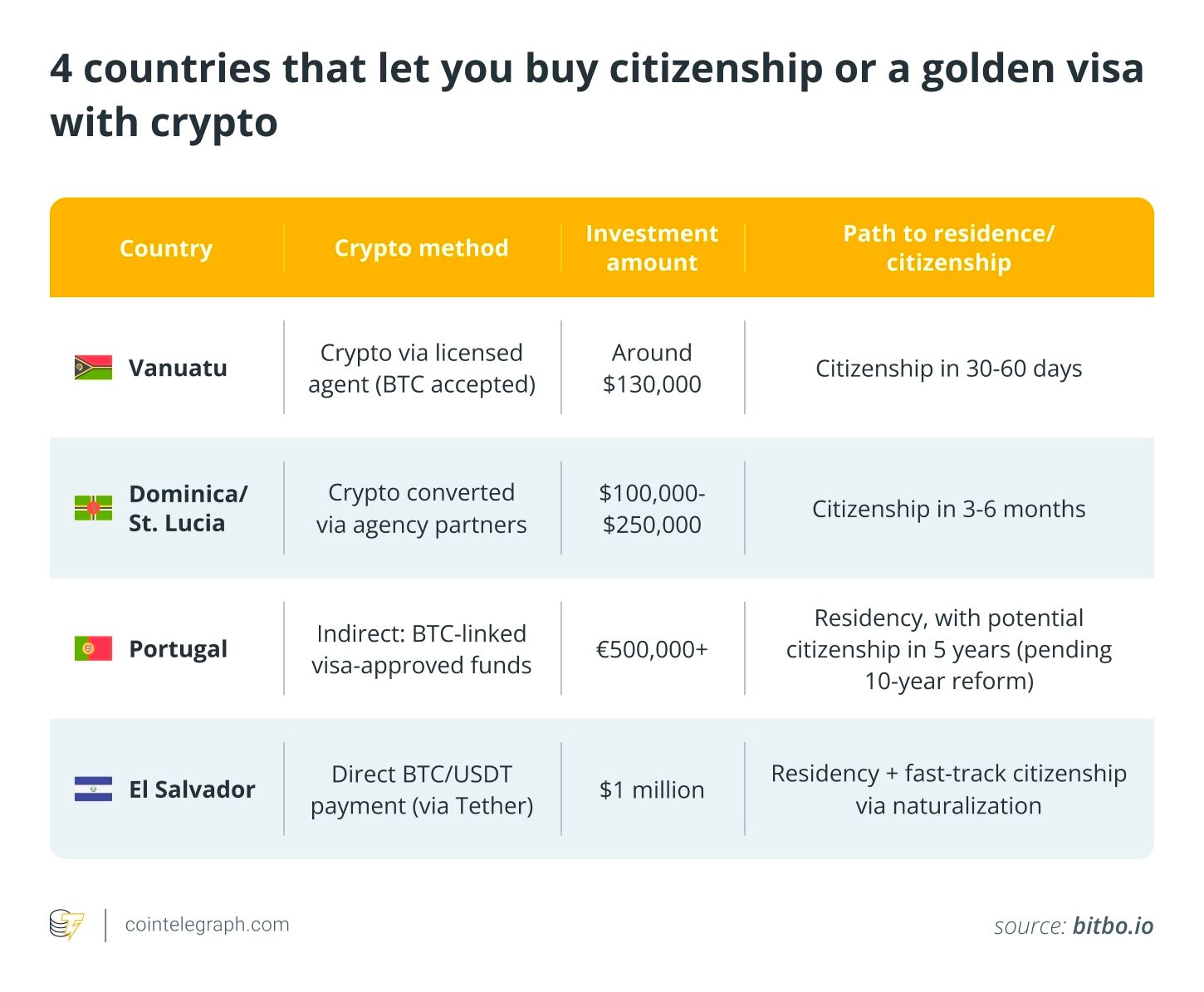✈️🌍 Passports for Bitcoin? The Rise of Crypto Citizenship in 2025
-

For years, passports and residency permits were strictly a fiat-only luxury. Now? Crypto whales and early adopters can use Bitcoin, Ether, or stablecoins to secure everything from Caribbean passports to European residencies. Let’s break down the crypto-friendly migration hotspots shaping 2025.
 Key Takeaways
Key TakeawaysVanuatu: Fastest citizenship (30–60 days), crypto via licensed agents.
Dominica & Saint Lucia: Caribbean passports in months, crypto accepted through agencies.
Portugal: EU residency through crypto-linked investment funds, path to citizenship.
El Salvador: Direct citizenship with $1M in Bitcoin/USDT — no fiat needed.
 Vanuatu: Passport in Weeks
Vanuatu: Passport in WeeksDonation starts at $130K (single applicant).
Crypto accepted by licensed agents, converted to fiat.
Remote process, no stay requirements, dual citizenship allowed.
Perks: Tax-free, visa-free to 90+ countries, family included.
 Fun fact: Vanuatu has no military — a true “neutral ground” for digital nomads.
Fun fact: Vanuatu has no military — a true “neutral ground” for digital nomads. Dominica & Saint Lucia: Caribbean in Crypto
Dominica & Saint Lucia: Caribbean in CryptoDominica: $200K donation.
Saint Lucia: $240K donation or $300K real estate.
Agencies accept BTC, ETH, USDT → converted for applications.
Passports in 4–9 months, covering entire families.
Strong travel freedom: EU, UK, Singapore, Hong Kong.
 ️ Heads up: Caribbean CBI passports face stricter checks in some countries.
️ Heads up: Caribbean CBI passports face stricter checks in some countries. Portugal: Golden Visa with a Crypto Twist
Portugal: Golden Visa with a Crypto TwistInvestment: €500K+ in regulated funds.
Now includes blockchain-focused venture funds and even “3 BTC investment” offers pegged to €500K.
Residency in year one: only 7 days required.
Path to EU citizenship in 5 years (pending review).
Perks: No language test, favorable crypto tax (long-term gains exempt).
 Portugal also has one of Europe’s strongest blockchain hubs.
Portugal also has one of Europe’s strongest blockchain hubs. El Salvador: Bitcoin Citizenship
El Salvador: Bitcoin CitizenshipWorld’s first fully crypto-native migration program.
$1M in BTC or USDT = residency + fast-track citizenship.
Initial deposit: $999 in BTC/USDT.
Entire family included, approval in as little as 6 weeks.
Investments go toward education, tech, and infrastructure.
 El Salvador was also the first to make Bitcoin legal tender — and runs a national Bitcoin treasury.
El Salvador was also the first to make Bitcoin legal tender — and runs a national Bitcoin treasury. ️ The Big Picture
️ The Big PictureFastest path: Vanuatu (30–60 days).
Most prestige: Portugal (EU passport in 5–10 years).
Most direct crypto use: El Salvador (no fiat at all).
Family-friendly: Caribbean programs (Dominica, Saint Lucia).
 Bottom line: Crypto migration is no longer theory. Whether you’re a nomad, a founder, or just “crypto-rich,” there’s now a passport waiting to be minted.
Bottom line: Crypto migration is no longer theory. Whether you’re a nomad, a founder, or just “crypto-rich,” there’s now a passport waiting to be minted. -
The idea of passports and residencies being directly purchasable with crypto honestly feels like the future we’ve all been talking about for a decade. It shows how far digital assets have come — from speculative tokens to hard utility in life-changing opportunities like second citizenship. Programs like Vanuatu and El Salvador prove that governments are no longer just tolerating crypto, but actually building policy around it. For investors and digital nomads, this is a massive win: diversification, tax advantages, global mobility — all powered by your crypto stack. Imagine onboarding into a new country without ever touching fiat. That’s true sovereignty.
-
This trend is exciting, but it also raises tough questions. When passports and residencies become tied to volatile assets like Bitcoin or USDT, what happens during a crash or a regulatory crackdown? Also, some of these “crypto-friendly” programs, especially in the Caribbean, already face scrutiny from major governments. If those passports lose visa-free travel privileges, your six-figure investment could suddenly have diminished value. And while El Salvador’s all-crypto program is groundbreaking, it also concentrates risk in a single, politically sensitive country. In short, crypto migration is real, but it’s not a magic ticket — careful due diligence is still key.

















